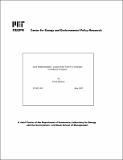| dc.contributor.author | Atkeson, Erica | en_US |
| dc.contributor.other | Massachusetts Institute of Technology. Center for Energy and Environmental Policy Research. | en_US |
| dc.date.accessioned | 2009-04-03T17:07:53Z | |
| dc.date.available | 2009-04-03T17:07:53Z | |
| dc.date.issued | 1997. | en_US |
| dc.identifier | 97003 | en_US |
| dc.identifier.uri | http://hdl.handle.net/1721.1/45072 | |
| dc.description.abstract | The United Nation's Framework Convention on Climate Change (FCCC), signed by more than 150 nations in June 1992, commits signatory countries to limit greenhouse gas (GHG) emissions to 1990 levels by the year 2000. Article 3.3 of the FCCC states that "efforts to address climate change may be carried out cooperatively by interested Parties" and "policies and measures to deal with climate change should be cost-effective so as to ensure global benefits at the lowest possible cost." These statements provide the basis for the concept of Joint Implementation (JI) and the development of an international system in tradeable emissions entitlements. Joint Implementation and tradeable emissions entitlements offer an opportunity to curb GHG emissions at a low-cost through international partnerships and cooperation. Title IV of the United States' 1990 Clean Air Act Amendments (CAAA), also known as the Acid Rain Program, is the largest public policy experiment in the use of tradeable permits. It also incorporates two voluntary compliance programs, the substitution and opt-in provisions. These programs are analogous to JI and therefore, provide instructive insight into the potential barriers to broad JI investment. The response to the substitution and opt-in programs has been significantly different. Many more units have entered the substitution program than the opt-in program. Based on an analysis of these programs, this paper concludes that high transaction costs, particularly the monitoring costs associated with Title IV compliance, deter potential opt-in participants from entering the Acid Rain Program. The differing response to Title IV's two voluntary programs suggests that transaction costs can be a substantial barrier to JI and that minimizing this cost is necessary for encouraging greater JI participation. | en_US |
| dc.description.sponsorship | Supported by the Environmental Protection Agency with the MIT Center for Energy and Environmental Policy Research through Cooperative Agreement No. Supported in part by a grant from Tokyo Electric Power Company to the Joint Program on the Science and Policy of Global Change. | en_US |
| dc.format.extent | 58 p | en_US |
| dc.publisher | MIT Center for Energy and Environmental Policy Research | en_US |
| dc.relation.ispartofseries | MIT-CEEPR (Series) ; 97-003WP. | en_US |
| dc.title | Joint implementation : lessons from Title IV's voluntary compliance programs | en_US |
| dc.type | Working Paper | en_US |
| dc.identifier.oclc | 37286296 | en_US |
